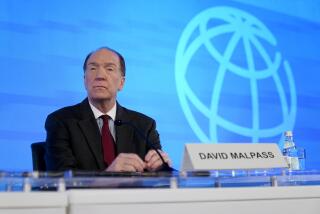Rivlin Resigns From Federal Reserve Board
- Share via
WASHINGTON — Federal Reserve Board Vice Chairman Alice M. Rivlin, a staunch supporter of the central bank’s strategy of letting the U.S. economy race forward even at some risk of inflation, unexpectedly announced Thursday that she will resign, saying that she wants to devote more time to untangling the finances of the city of Washington.
Rivlin’s departure in mid-July is not likely to make much difference to Fed policy, but it will give President Clinton the chance to appoint another member to the central bank, which has become the most powerful government manager of the economy in recent decades.
And though her voice on policy was muted, others said that she will be missed as a conciliatory presence.
“She was the glue that held the consensus together,” said David M. Jones, a veteran Fed-watcher and chief economist at Aubrey G. Lanston & Co. in New York.
For Rivlin, 68, the departure will mean the end of a string of high-profile, high-pressure assignments in recent years.
Before arriving at the Fed in June 1996, she was director of the White House Office of Management and Budget during the height of the budget battles between Clinton and the Republican-controlled Congress that led to a government shutdown.
“She’s had a role in just about every policy battle that has occupied Washington in recent decades,” said Robert D. Reischauer, a veteran economist with the Brookings Institution, the Washington think tank that Rivlin will rejoin when she leaves the Fed. “She’s had a remarkably varied and productive career in policymaking in Washington.”
Originally, Rivlin was not expected to wield much influence at the Fed, in part because she was succeeding Princeton economist Alan S. Blinder, who clashed with Fed Chairman Alan Greenspan, and in part because her specialty was the nuts and bolts of government budgets, not monetary policy.
But analysts said she made a name for herself by tackling arcane technical issues faced by the Fed, and settled in as a staunch ally of Greenspan in his struggle to maintain low interest rates even in the face of trends that seemingly could spark inflation.
Besides her policy role, she is widely credited with improving the internal management of the Fed, which appeared sleepy at times, and with advancing the careers of women at the male-dominated institution.
Friends said that one factor in her decision to resign was the fact her husband, economist Sidney G. Winter, was recently treated for prostate cancer.
Rivlin used the occasion of her resignation letter to praise both Clinton and Greenspan.
She called the Greenspan-era Fed “a strong bulwark of U.S. economic policy,” and said: “I believe we have contributed to keeping the American economy growing and reducing strains in the international financial system.”
She said that it was “an enormous privilege” to serve the president and “help put together the policies that turned that huge budget deficit into a surplus.”
“We did the right thing, and it worked!” she wrote.
Rivlin loves the intricacies of government policy, a fact that she demonstrated most recently by accepting the apparently thankless job of heading the District of Columbia Financial Assistance Authority, which is trying to help Washington’s municipal government dig out of decades of mismanagement.
Besides serving on the Fed, in the executive branch and in city government, Rivlin also had a stint in the legislative branch. She was the founding director of the influential Congressional Budget Office from 1975 to 1983.
In addition to her municipal duties, Rivlin will take up a chair in urban and metropolitan policy at Brookings, an institution that has served as her Washington base on and off since the late 1950s.
Rivlin received a bachelor’s degree in economics from Bryn Mawr College near Philadelphia in 1952, and master’s and doctorate degrees in economics from Radcliffe College in 1955 and 1958.
She and Winter have three children and three grandchildren.
More to Read
Sign up for Essential California
The most important California stories and recommendations in your inbox every morning.
You may occasionally receive promotional content from the Los Angeles Times.













